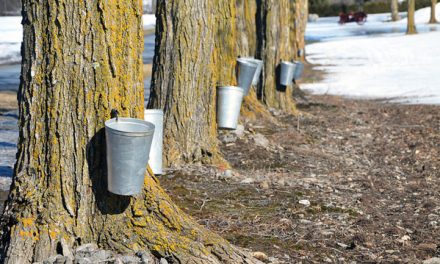by Cindy Macdonald
AgriNews Staff Writer
CerealSmart is a one-day agricultural conference held prior to the annual FarmSmart conference. This year’s event took place in Waterloo on Jan. 17. Several hundred people attended the live event, and it was broadcast to several satellite sites around the province, including Kemptville.
The emphasis was on winter and spring cereals, looking closely at equipment, methods, agronomy and profitability.
The grower panel at the end of the day featured short presentations by Ontario growers, sharing lessons learned from their operations. Jenn Doelman, a certified crop advisor and part owner of BDS Farms, discussed techniques used on her farm, located about one hour northwest of Ottawa in Renfrew County.
Doelman said she and her husband were early adopters of the no-till methodology. They farm a diverse rotation of seven to 11 crops per year. Their farm has heavy silt clay, and experiences 100 frost-free days and 2650 CHU. The largest challenges, Doelman said, are drought and soil structure.
“Cereals give us resilience, and are the only way to make corn and soy profitable.”
From 2006 to 2015, Doelman produced soy and corn. Beginning in 2016, the goal became a more balanced rotation and prioritization of soil health. The unanticipated side effect, she said, is better cash flow and better time management.
She noted that spring cereals are very market specific. In order to make money from spring cereals, Dollman said, “you absolutely need good drainage. You need good agronomics and you need to know your land.” She also said producers should plan for good moisture and bushel weights.
Deb Campbell of Agronomy Advantage, discussing spring cereals, suggested participants put all their winter wheat management techniques to work on spring cereals. She also commented that early seeding of spring cereals is of paramount importance.
In Ontario, spring wheat is generally the fallback option when producers don’t get the winter wheat put in. Yields have been erratic for the last 8 to 10 years, according to Campbell.
Barley, Campbell noted, is on the lower tier of cereals. In Ontario, there’s a lack of market, lack of genetic development and lack of contractors. It has seen little yield growth over the years, rising from 58 to 63 bushels in 35 years, and offers inconsistent performance.
Oats are the shining star in terms of genetic development and intensive management, says Campbell. In 2019 trials, intensively managed oats produced 132 bushels, while un-managed oats (no fungicide) produced 109 bushels. “That’s a significant response to management,” said Campbell. In Eastern Ontario, the response range was more narrow, with only 4-5 bushels of response gain.
“Barley, in my experience, is way more responsive to fungicide,” Campbell concluded. Nitrogen also produces a yield gain in barley. “These newer varieties are highly responsive and productive. These aren’t Grandpa’s barleys.”
Her conclusion: “Spring cereals are far more responsive to management than winter wheat.” She feels we are on the doorstep of doubling yield in some spring cereals.












